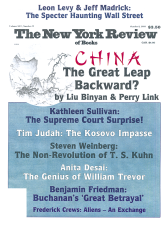In 1992, I asked Bill Clinton what book (other than the Bible) had most influenced him. After pausing for thought, he answered, “the Meditations of Marcus Aurelius,” a fairly austere book for so genial a man. Perhaps he took the Roman emperor as a pattern for the intellectual as ruler, a kind of second-century JFK, since Marcus the warrior was also a Stoic philosopher.
At a time when Clinton is doing some soul-searching, can this “most influential” book be coming back into his mind, and if so what lessons would it have for him? On Martha’s Vineyard Clinton spoke of extending forgiveness as a way of receiving it. This was taken as an olive branch put forward toward Ken Starr. Perhaps Clinton was thinking of Marcus’ advice on controlling anger, especially since the Roman offered an instant qualification, saying he should “be biddable and conciliatory with aggressors who provoke me—the minute they are willing to back off” (1.7). That is an olive stick you can use for beating those who don’t back off.
As Clinton recalls his favorite book, other passages may be less consoling this time—sentences like this: “Don’t consider as profitable anything that compels you to betray your given word, to abandon your honor, to give in to hate or suspicion or vilification, to play a false role, or to desire what can only be indulged behind hiding walls and curtains” (3.7). No better comfort can be drawn from the advice to “be heroically accurate in every word you utter and you will be happy” (3.12).
Marcus didn’t think much of sex. In fact, he says that lust is a worse sin than anger, since the angry man at least struggles for control, while the lustful one surrenders entirely to his desire (2.10). On the other hand, Marcus’ description of the sexual act may give Clinton an even better escape hatch than Judge Wright’s definition did. He can say “I did not have sex with that woman” if he is sticking by his favorite author, who dismisses sex as a mere “friction with a woman’s innards and spasm of jetting slime”(6.13). Semen smears intrigued Marcus, since man begins as one—his life span takes him from “a bit of slime yesterday to a mummy’s dust tomorrow” (4.2). As he puts it, “What a thing from what a thing” (10.26).
Perhaps the most important thing Clinton can find in the Meditations is, at this point, an indication that his poll ratings may not sink too precipitously: “It is an oddity of the human species to favor those who fall. This happens if you are sympathetic enough to see that they are like you, that they acted through ignorance and lack of will, that they and you will soon be dead, and that they did you no real harm if they did not make your own self-control less than it was” (7.22). Now there is an olive branch not good for beating anyone.
This Issue
October 8, 1998



